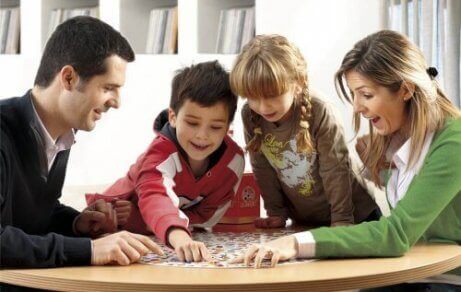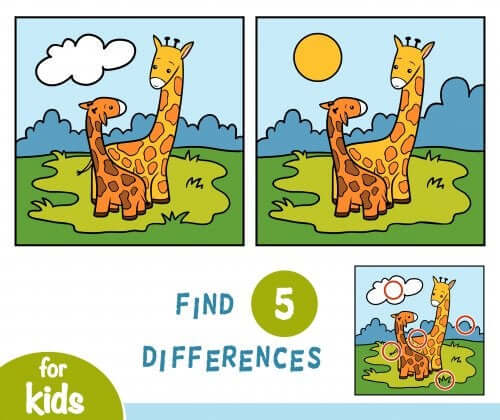6 Mind Exercise Games for Children to Play at Home

Discover a series of mind exercise games for your little ones to play at home. All you’ll need are some folders, colored pencils, and lots of imagination.
Learning through play: This is the goal that parents should establish over vacation when it comes to their children. Of course, summer vacation is meant to give children the opportunity to rest after a long school year. Nevertheless, it’s still important to keep their minds active.
We’re not talking about sitting your kids down in front of workbooks to solve monotonous mathematical and grammar exercises. Rather, we’re talking about using games as a tool for learning.
Homemade mind exercise games for children
1. The memory game
One of the most classic and simple games that’s a big hit with little ones is the memory game. The game’s dynamic alone is entertaining for children. But you can make it even more attractive and educational if you allow your child to participate in creating the game.
To make your own memory game, you’ll need the following supplies:
- The images that your child wants to use
- Cardboard or poster board

Have your children draw or cut out the images they’d like to use in the game (two copies per image). Then, glue the images to cardboard squares. Make sure all of the squares are the same size and color.
To play, simply place the cards face down and take turns turning them over in order to form pairs. You’ll be surprised how well your little ones are able to remember the positions of the different images!
This is a fantastic game for exercising visual acuteness and memory. What’s more, it’s a great activity that your entire family can enjoy together.
2. Alphabet bingo
Alphabet bingo is the perfect mind exercise game for children who have just learned their ABCs. This activity is a variation of the famous game played with numbers.
You can create bingo playing cards yourself by using different colors for the letters. Your child will review the alphabet without even realizing it while he or she makes the cards.
When playing the game, players can call out “bingo” if they complete a full line on their cards, or “full card” when they complete the entire card.
3. Jigsaw Puzzles
Another option when it comes to homemade mind exercise games is to make jigsaw puzzles. You can use an old folder or posterboard to make a quick and easy puzzle.
Puzzles are ideal for helping children exercise logical thought and reasoning. They’re also perfect for developing other kinds of abilities, like hand-eye coordination and fine motor skills.
Another very original variation of this classic activity is to create puzzles with lego pieces. All you need are several lego pieces, a piece of posterboard where you can draw the pieces, and a pen or marker.
Once you’ve drawn the outline of the lego pieces and cut them out, mix them all together. Then your children can match each cut-out with its matching lego pieces.
An ideal game for discovering geometry and practicing reason with the littlest members of your family.
More homemade mind exercise games for children
4. Find the differences
Drawing and coloring are favorites when it comes to activities for children. Therefore, using black and white “find the differences” pictures are an excellent option, as children can color them in afterward.
This activity is just right for children who have a hard time staying concentrated on tasks. Also, it helps develop visual acuteness. You can search for printable “find the differences” images on the internet, of you and your kids can create them at home.

5. Treasure hunts
This is a very simple activity that will delight your children’s sense of adventure and love of mystery. Treasure hunts are an activity for developing reasoning skills. Children must follow the clues that they discover along the way in order to find a hidden treasure.
Furthermore, they’ll develop their visual perception, concentration, and attention skills. This is because attention to detail is an essential part of the game.
At the same time, there are many different ways to design and carry out a treasure hunt. You can involve mathematical operations, riddles, or any other activity that allows children to practice and develop their abilities.
6. Riddles
For this final mind exercise game, you don’t need any materials at all – just your imagination. The words and rhythm you use to recite these verses will attract and intrigue your children and motivate them to discover the answer.
As they do, your little ones will develop the association of ideas and the formation of concepts, as well as imagination and thought.
Discover a series of mind exercise games for your little ones to play at home. All you’ll need are some folders, colored pencils, and lots of imagination.
Learning through play: This is the goal that parents should establish over vacation when it comes to their children. Of course, summer vacation is meant to give children the opportunity to rest after a long school year. Nevertheless, it’s still important to keep their minds active.
We’re not talking about sitting your kids down in front of workbooks to solve monotonous mathematical and grammar exercises. Rather, we’re talking about using games as a tool for learning.
Homemade mind exercise games for children
1. The memory game
One of the most classic and simple games that’s a big hit with little ones is the memory game. The game’s dynamic alone is entertaining for children. But you can make it even more attractive and educational if you allow your child to participate in creating the game.
To make your own memory game, you’ll need the following supplies:
- The images that your child wants to use
- Cardboard or poster board

Have your children draw or cut out the images they’d like to use in the game (two copies per image). Then, glue the images to cardboard squares. Make sure all of the squares are the same size and color.
To play, simply place the cards face down and take turns turning them over in order to form pairs. You’ll be surprised how well your little ones are able to remember the positions of the different images!
This is a fantastic game for exercising visual acuteness and memory. What’s more, it’s a great activity that your entire family can enjoy together.
2. Alphabet bingo
Alphabet bingo is the perfect mind exercise game for children who have just learned their ABCs. This activity is a variation of the famous game played with numbers.
You can create bingo playing cards yourself by using different colors for the letters. Your child will review the alphabet without even realizing it while he or she makes the cards.
When playing the game, players can call out “bingo” if they complete a full line on their cards, or “full card” when they complete the entire card.
3. Jigsaw Puzzles
Another option when it comes to homemade mind exercise games is to make jigsaw puzzles. You can use an old folder or posterboard to make a quick and easy puzzle.
Puzzles are ideal for helping children exercise logical thought and reasoning. They’re also perfect for developing other kinds of abilities, like hand-eye coordination and fine motor skills.
Another very original variation of this classic activity is to create puzzles with lego pieces. All you need are several lego pieces, a piece of posterboard where you can draw the pieces, and a pen or marker.
Once you’ve drawn the outline of the lego pieces and cut them out, mix them all together. Then your children can match each cut-out with its matching lego pieces.
An ideal game for discovering geometry and practicing reason with the littlest members of your family.
More homemade mind exercise games for children
4. Find the differences
Drawing and coloring are favorites when it comes to activities for children. Therefore, using black and white “find the differences” pictures are an excellent option, as children can color them in afterward.
This activity is just right for children who have a hard time staying concentrated on tasks. Also, it helps develop visual acuteness. You can search for printable “find the differences” images on the internet, of you and your kids can create them at home.

5. Treasure hunts
This is a very simple activity that will delight your children’s sense of adventure and love of mystery. Treasure hunts are an activity for developing reasoning skills. Children must follow the clues that they discover along the way in order to find a hidden treasure.
Furthermore, they’ll develop their visual perception, concentration, and attention skills. This is because attention to detail is an essential part of the game.
At the same time, there are many different ways to design and carry out a treasure hunt. You can involve mathematical operations, riddles, or any other activity that allows children to practice and develop their abilities.
6. Riddles
For this final mind exercise game, you don’t need any materials at all – just your imagination. The words and rhythm you use to recite these verses will attract and intrigue your children and motivate them to discover the answer.
As they do, your little ones will develop the association of ideas and the formation of concepts, as well as imagination and thought.
All cited sources were thoroughly reviewed by our team to ensure their quality, reliability, currency, and validity. The bibliography of this article was considered reliable and of academic or scientific accuracy.
- Crespillo, E. (2010). El juego como actividad de enseñanza-aprendizaje. Gibralfaro.
This text is provided for informational purposes only and does not replace consultation with a professional. If in doubt, consult your specialist.








